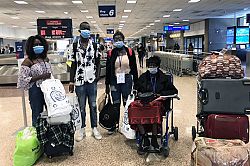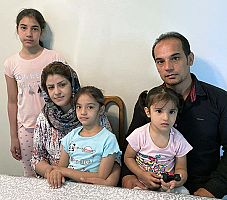We Need a Robust U.S. Refugee Resettlement Program

Aden Batar
The U.S. refugee resettlement program is a vital, life-saving program that protects the most vulnerable refugees who cannot return to their homes and helps to reunite families fractured by forced migration. In the midst of the worst global displacement crisis in world history, with more than 29.6 million refugees worldwide, a strong U.S. refugee resettlement program is a humanitarian expression of our core American values, including religious freedom and democracy, a strategic tool to support key allies and help to stabilize sensitive regions impacted by forced migration, and a positive economic driver for many welcoming U.S. communities.
Refugees are individuals who have fled their homes due to a well-founded fear of persecution based on race, religion, nationality, political opinion, or membership in a particular social group in their home country. Resettlement is the last resort for refugees who cannot rebuild their lives where they have first fled or return safely to their home country; it is a critical safety net in the humanitarian system. Less than one percent of refugees worldwide have access to resettlement. Due to ongoing wars, regional instability, lack of economic or governmental infrastructure, and religious persecution, many refugees will never be able to repatriate to their country of origin safely. Additionally, due to particular vulnerabilities such as gender-based violence, and continued threats and discrimination, many refugees will never be able to integrate into the community to which they fled.
Refugees who are selected to be resettled to the United States are the most rigorously vetted individuals to enter the U.S. and must pass through a series of security and medical clearances in order to be approved. Since the inception of the formalized U.S. refugee resettlement program in 1980, more than 3 million refugees have been resettled to the United States. Refugees have become citizens, civic leaders and entrepreneurs, and have contributed enormously to our country. Thousands of volunteers, houses of worship and business leaders work alongside recently arrived refugees to ensure they can thrive here and enjoy the liberties and protections offered by our country. Indeed, the U.S. refugee resettlement program is a vital public-private partnership that helps refugees achieve self-sufficiency and a sense of belonging in their new communities.
The COVID-19 pandemic has challenged every level of American society, and refugees have been essential in the fight against this pandemic. Over 176,000 refugees are health-care professionals treating COVID-19 patients in hospitals and nursing homes and clinics, and over 175,000 are part of the U.S. food supply chain, laboring as farm workers who put food on our tables, and truck drivers and grocery store workers making sure the shelves are stocked. Refugees have been on the frontlines reaching out as new neighbors to help the communities that welcomed them to overcome this virus.
The Presidential Determination for Fiscal Year 2020 was set at the lowest level in U.S. history, at 18,000 individuals. Since the start of the U.S. refugee resettlement program in 1980 until 2016, the average annual refugee admissions goal has been 95,000. We urge the Department of State to strengthen the U.S. refugee admissions program as a life-saving foreign policy and humanitarian tool and admit 95,000 refugees in FY2021, a return to historic norms. We believe having a robust U.S. refugee resettlement program is part of strong U.S. leadership and also promotes democracy and supports the United States’ foreign policy priorities agenda abroad.
The complete decimation of the refugee resettlement program would devastate the people of Utah who stand ready with open arms to welcome refugee families.
Catholic Community Services of Utah assists newly arriving refugees by providing the supportive services that help them through their difficult transition. Each year, CCS resettles hundreds of refugees in Salt Lake City and surrounds them with programs that help them become stable, healthy and happy. Our goal is to help those who have never known liberty have a chance to achieve the American dream and find self-supporting employment.
Welcoming the persecuted is a fundamental American value and the backbone of our nation’s history. This country was founded on the hard work, determination and skills of generations of immigrants from all countries, religions and backgrounds. We must continue to be a beacon of hope.
While the administration effectively cancels the refugee program – hoping that no one is noticing – there is enough support and resources to welcome 95,000 refugees next year.
Congress must hold the administration accountable to keeping its promise to tens of thousands of refugees still waiting to see if they will be resettled this year as well as those who have yet to enter the resettlement process. The destruction of our refugee admissions program would be devastating for them as well as our community and absolutely diminish America’s standing on the global stage.
Aden Batar, MPA is director of Migration and Refugee Services for Catholic Community Services of Utah.
© Copyright 2024 The Diocese of Salt Lake City. All rights reserved.


Stay Connected With Us